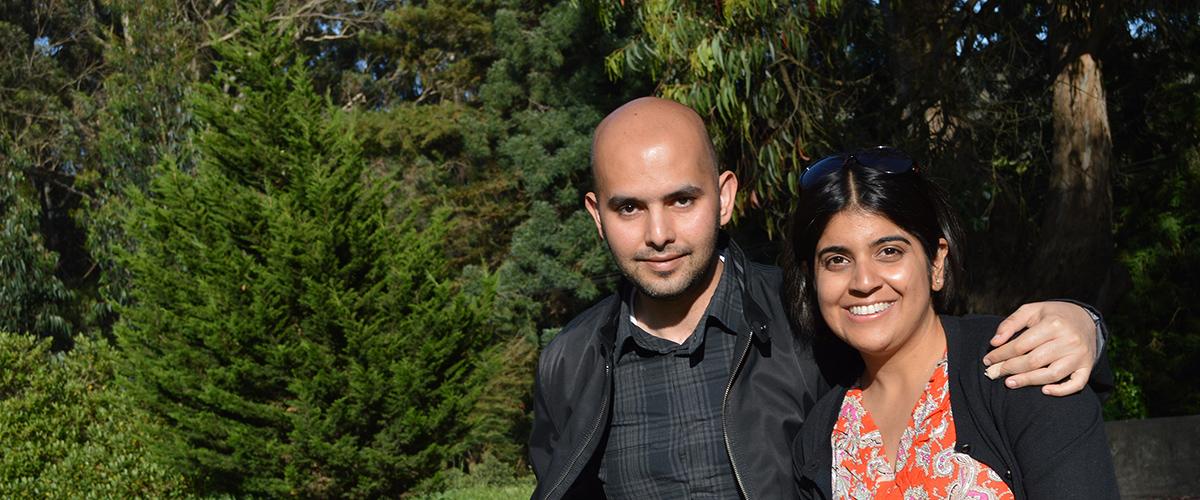
Speech Transcript, 2011 Myotonic Annual Conference
My name is Eric Wang, and it's an incredible honor for me to serve as an advocate for myotonic dystrophy, both as a researcher who studies myotonic dystrophy, and as a person who grew up seeing the effects of DM every day. I have watched how it has impacted both the affected and unaffected members of my family.
When I look back on the past 15 years of my life, there was a clear turning point in my relationship with DM, how it affected my family, and how I dealt with this fact. Throughout junior high school and high school, I watched my dad gradually lose fine motor control, lose the ability to get up and down stairs, and go through several close calls with severe falls and heart function.
In college, I remember how every time I came home for holiday breaks, I would notice how my dad looked a bit different each time as a result of his muscle wasting. The disease impacted me and my entire family in a negative way, and in general we felt helpless as to what we could do to slow down the effects of this terrible disease.
After college, I worked in a lab where I studied cardiovascular biology. During that time I applied to graduate school, and had to choose the area of research where I wanted to do my Ph.D. I consulted other students in the lab about interesting research areas, and there was one particular evening that really served as a eureka moment for me. I was having dinner with another student in the lab and I remember it very vividly. We were in the basement of John Harvard's Pub in Cambridge, Massachusetts. I remember that we both ordered a mushroom swiss burger; it was a good burger, and not because of how it tasted; it was so good because that night a light bulb went off in my head.
It was there that my friend suggested that I study DM, to be a 'champion' of the disease. In a way, the idea was extremely obvious; to use my biology training to study a disease that runs in my family; but for some reason I have never considered it seriously. I think it was partly due to a narrow way of thinking; thinking that I couldn't make a significant difference. This narrow way of thinking is something that I would like us all to transcend in some way.
That night, my journey of empowerment began. I later found David Housman at MIT who with other members of this audience found the gene for DM1 in 1992, and also sought out Chris Burge, an expert in computational biology and the study of gene regulation whose recent entry in the DM field has already led to advances in our understanding of DM. I also sought out leaders in the DM field who have served as informal mentors to me over the past five years and let me tell you, the DM field is absolutely remarkable for its collegiality, drive and focus. As a result, with their help I have been able to make contributions to the field that will hopefully have an impact down the line.
Investigators, we need to bring other people into the field who have complementary expertise that we need; this means your colleagues who study other aspects of biology, our industry partners and those in regulatory bodies. To conquer this disease, we will need, as many have described over the past few days, to work together as a team, and together with patients.
DM families, many people go through life not finding that thing that drives them, that thing they live or die for. Obviously DM in my family has been a curse because of its terrible effects, but on the other hand, DM has given me an incredible purpose in life; a challenge and obstacle to overcome; through which we will all do our best to prevail and become better people.
I urge you to take a moment to imagine a world in which you or your family still has DM, but you aren't limited by practical or financial concerns. What would that world look like? Is it a world in which all doctors know about DM? Is it a world in which most people on the street understand what a DM patient looks like and what their needs are? Is it a world in which teachers at school know how to deal with the needs of a DM child? Is it a world where genetic testing is free? What can we do together to get closer to that world?
This, I think, is the adjustment in thinking that we should all make; to dream big, and of course to later come back to reality, but to have the courage to dream. Progress in the DM field has been phenomenal but we have not yet reached the end of the road. There will be hills and valleys, and numerous storms to weather. We need to be prepared for these moments but must also be prepared for the inevitable day when therapies are a tangible reality.
We must organize so that we can move forward carefully yet deliberately with a passion tempered by prudence. We need to support and encourage one another so that we can get through all of these experiences in one piece, and we must make it our goal to continue pushing on in spite of all odds. We will overcome this disease, but it will need to be a group effort.
In the way that DM has served as a paradigm for diseases of RNA toxicity, let's show the world our paradigm for how to work together to cure a terrible disease.
Eric Wang, Ph.D.
Harvard-MIT Health Sciences and Technology
Myotonic Fund-A-Fellow Postdoctoral Fellow
Myotonic Dystrophy Family Member

